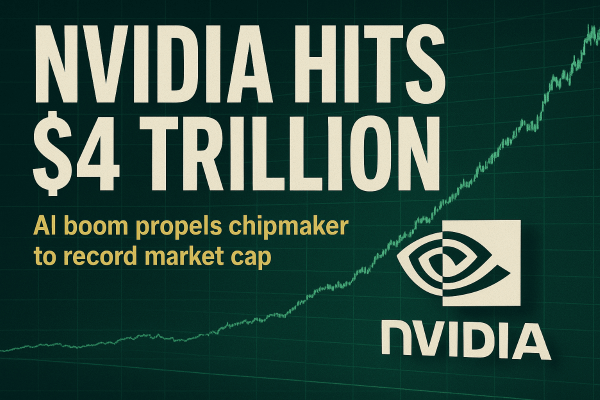
Posted June 23, 2025
By Davis Wilson
"Stablecoins" 3...2...1...Liftoff
The word “stablecoin” might sound boring…
But don’t let the name fool you.
Stablecoins are quietly becoming one of the most useful and powerful tools in the entire financial system.
In fact, I just finished a deep dive on this – and what I found blew me away:
- $27 trillion in stablecoin transactions were processed last year. That’s more than Visa and Mastercard combined.
- The total stablecoin market is now over $200 billion.
- USDC, the stablecoin created by Circle, has $61 billion in circulation alone.
According to Treasury Secretary Scott Bessent, the U.S. stablecoin market is expected to grow from $200 billion to $2 trillion in just three years.
Globally? It could hit $20 trillion – a 100x opportunity.
That growth won’t just benefit the coins themselves. It’ll lift the companies and tokens building the infrastructure.
Names like ENA, MKR, HBAR, and AVAX are positioning for this long-term trend.
Think of this like getting into Circle before it IPO’d.
But let’s back up.
How are people actually using stablecoins to make money today?
Here are three of the most common ways – broken down in plain English, with step-by-step examples.
1. Earning Interest (Like a High-Yield Savings Account)
This is the easiest and most beginner-friendly option.
Just like a savings account pays you interest, some crypto platforms will pay you to hold stablecoins – often with much better rates than a bank.
Let’s say you’re using Coinbase.
Step 1: Buy USDC (a U.S. dollar-backed stablecoin)
Step 2: Opt into USDC rewards
Step 3: Sit back and earn interest – currently 4.5% annually
This works because platforms like Coinbase lend USDC to institutions or invest in safe assets, sharing interest with you.
If you hold $1,000 in USDC, that could earn you $40–$50 a year, passively.
Not life-changing, but far better than the average bank’s savings account and it’s extremely easy to set up.
2. Providing Liquidity for Stablecoin Pairs
This option is a little more advanced.
Here you supply stablecoins to a “liquidity pool” on a decentralized exchange (DEX), earning fees when others trade that pair, like USDC/ETH.
It’s like renting out your stablecoins to traders.
Here’s an example using Coinbase Wallet:
- Download Coinbase Wallet
- Transfer USDC from your Coinbase account
- Connect your wallet to Uniswap
- Join a USDC/ETH liquidity pool
- Earn a portion of the 0.3% trading fee each time that pair is used
If the pool earns $100 in fees monthly, your share (based on your stake) might be $5 – not a bad return!
Stablecoin pools are low-risk since one side (USDC) doesn’t fluctuate.
The growing $200 billion stablecoin market fuels DEX trading, generating fees for you.
3. Investing in the Companies Behind Stablecoins
The upside here is huge.
Stablecoins like USDC, DAI, and USDe are issued by companies or decentralized protocols — and these are the entities quietly powering a massive part of the crypto economy.
When a stablecoin is minted, someone pays $1 and receives a digital $1 in return.
That real dollar doesn’t just sit there – the company puts it into low-risk assets like Treasury bills, collects the interest, and keeps the profits.
Some also earn transaction fees or lend out the coins for additional yield.
This is exactly how Circle, the issuer of USDC, makes money.
Now that Circle is a public company, investors can finally get direct exposure to one of the largest stablecoin engines in the world.
But Circle isn’t the only way to play this trend.
Here are other public tokens and platforms tied to the stablecoin ecosystem:
- ENA: The token behind Ethena, which issues USDe. USDe has a $5 billion supply, but ENA’s market cap is only $1.7 billion – that’s the current valuation gap (and opportunity).
- MKR: The governance token of MakerDAO, which manages DAI – one of the longest-standing decentralized stablecoins.
- HBAR: A smart contract network used by Circle to bring USDC to the Hedera ecosystem. Think of it like a development layer for stablecoins.
- AVAX: Similar to HBAR, Avalanche is a high-speed blockchain platform supporting stablecoin infrastructure across DeFi and enterprise applications.
If the global stablecoin market grows from $200 billion to $20 trillion, the infrastructure behind it could see exponential returns.
My Final Thoughts
Stablecoins may not be flashy – they’re built to be stable, after all.
But they’re the bridge between traditional finance and crypto.
And whether you’re earning interest, saving on transfers, or investing in the infrastructure, the opportunity is real.
I’ll be covering this theme more going forward.
Because it’s not just the future of money. It’s happening now.
Sign Up Today for Free!
Davis Wilson is attempting to make $1 Million in the stock market.
He’s starting with just $100,000.
That’s a 10X return on his money.
And the best part… He’s going to be closely documenting his journey for you to follow along – full transparency.
You can follow along by signing up for The Million Mission absolutely free.
His high risk/high reward alerts will be delivered straight to your inbox.
That means…
- You’ll know exactly what Davis is investing in throughout his journey…
- You’ll know his immediate thoughts on breaking news that can impact his (and your) portfolio…
- And you’ll get the opportunity to follow along in your own portfolio (Up to you!).
Look for these alerts on Monday, Wednesday, and Friday to start, with an “Ask Davis” email on Saturday where he’ll respond directly to reader questions and feedback.
Inside each weekday alert, you'll find timely insights and investing opportunities that Davis is targeting in his own portfolio.
These will range from AI plays to cryptocurrencies to consumer staples.
No stocks or strategies are off limits for this audacious goal.
Can he pull it off?
Enter your email below to find out.

>>This Week<< The TRUTH Comes Out
Posted July 14, 2025
By Davis Wilson

The Truth About My Trades (and Why I Rarely Make Them)
Posted July 12, 2025
By Davis Wilson

$4,000,000,000,000 – And It’s Still Early
Posted July 11, 2025
By Davis Wilson

The Strange Reason I Own Bitcoin
Posted July 09, 2025
By Davis Wilson

Simple (And 100% Free) Stock Picking 101 in <10 Minutes
Posted July 07, 2025
By Davis Wilson


